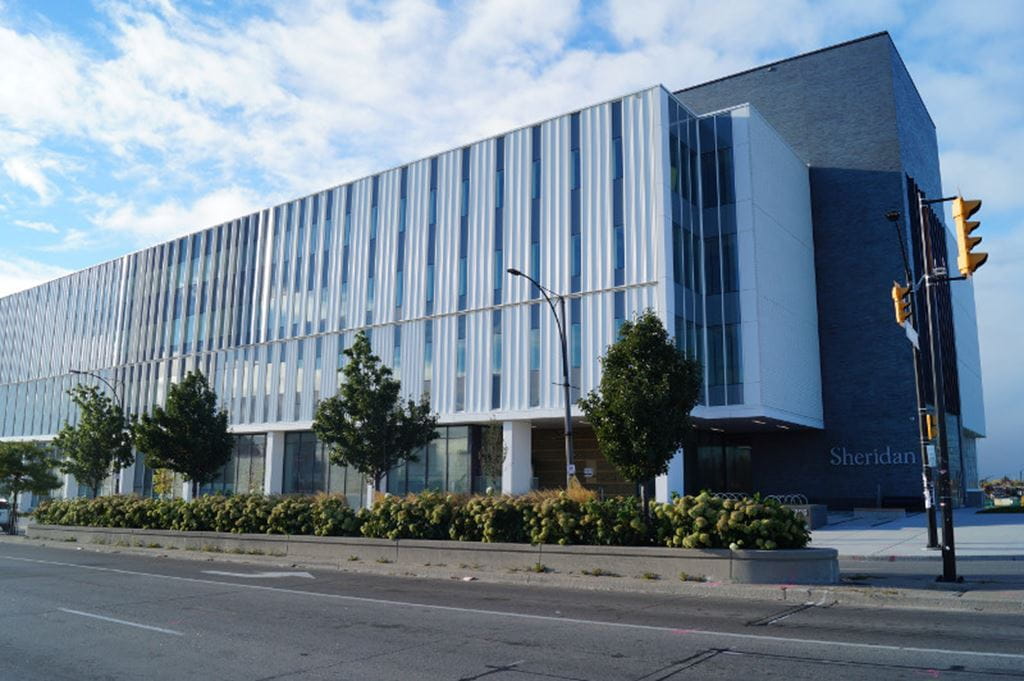
Sheridan named top 'green college' for leading sustainability efforts
Sheridan has been named a top “green” college according to the Princeton Review’s renowned Guide to 399 Green Colleges - 2018 Edition.
The ninth annual edition highlights the most environmentally responsible colleges with strong commitments to sustainability. The schools were selected based on academic offerings, campus policies, initiatives, activities and career preparation for students. Most of the 399 schools named in the report are based in the U.S. Out of the 13 Canadian schools named, Sheridan represents the only college.
“It’s very gratifying to be recognized for our ambitious goals to create innovative solutions to environmental issues,” says Dr. Janet Morrison, Sheridan’s President and Vice Chancellor. “As a leading academic institution, employer and community partner, Sheridan is committed to embracing all aspects of sustainability. Our goal is to become the institutional model for a 21st-century organization.”
Sheridan is a proud leader of sustainability initiatives and is fully committed to integrating sustainability into all aspects of teaching, learning, energy, waste and operations. The College retains its Silver rating from the Association for the Advancement of Sustainability in Higher Education, reflecting significant improvement in energy efficiency, less waste generated per campus user, and better data tracking.
Established in 2010, Sheridan’s Office for Sustainability seeks to engage staff and students in sustainability initiatives as part of the institution’s core values, identity and future goals. The Office’s primary activities are guided by Sheridan’s Mission Zero commitment, which is comprised of two major initiatives: (1) The Integrated Energy and Climate Master Plan (IECMP), which aims to decrease the College’s overall energy and carbon emissions by 50% as of 2030; and (2) Zero Waste Sheridan, the enthusiastic undertaking to become a Zero Waste campus by 2020.
Sheridan is proud to host the following sustainability initiatives that support its Mission Zero commitment:
District Energy Project
Sheridan’s District Energy Project has transformed the Davis and Trafalgar campuses into centralized energy hubs, providing heating and cooling on site while sharing additional energy with surrounding communities. District energy systems help conserve energy while increasing usage efficiency, and are an important component of the IECMP.
Greenhouse Gas Emission Reduction
As of 2017, Sheridan reduced its direct and indirect greenhouse gas emissions by 37% (compared to the 2011 baseline). Sheridan recently partnered with the Town of Oakville to develop a Community Energy Plan (CEP) that will help the city create clear targets for reducing its energy and greenhouse gas emissions.
HMC Expansion – Phase 2
Sheridan utilized groundbreaking sustainable design strategies in the expansion of its Hazel McCallion Campus (HMC) in Mississauga, Ont., by creating a “Living Laboratory” – a world-class facility that achieves the highest levels of sustainable design and energy efficiency. Building features include smart infrastructure, zero waste foundations, water efficiency and reuse, lighting and ventilation, as well as the use of sustainable materials. The 220,000-square-foot building officially opened in January 2017 and has since been chosen as a finalist in Canada Green Building Council’s (CaGBC) 2018 Ontario Green Building Excellence and Leadership Awards (Excellence in Green Building – New Construction). HMC expansion began in the Fall of 2014. While the majority of work is now complete, the Phase 2A project is currently underway.
Material ConneXion Library
The Material ConneXion Library at HMC is the first of its kind in Canada. The innovative space contains over 1,000 future-forward materials and samples of material processes sourced worldwide. Many materials in the library are considered sustainable, while others are recyclable, renewable or biodegradable. Specifically curated for Sheridan students, the collection aims to enhance the sustainability of design projects.
Repair Cafés
All three of Sheridan’s campuses host Repair Café events, which are part of an initiative that fosters community togetherness through the free repairing of broken household items and the sharing of knowledge between volunteer fixers and visitors. This movement aims to change society’s throwaway mindset and divert waste from landfills by extending the life span of various products.
Smart Commute Options
In collaboration with SustainMobility and Smart Commute Halton, Sheridan promotes the Smart Commute Program at all three of its campuses to support sustainable commuting options. Sheridan’s Trafalgar and Davis campuses have been awarded Gold status by Smart Commute for providing outstanding alternative transportation options to its students and employees.
Waste Reduction
The College successfully reduced its landfill waste by 23% in 2015 – 2016 (compared to the previous year), and is on track to become a Zero Waste campus by 2020. Recycling and organic disposal increased by 882 metric tonnes (188%) as of 2016.
About The Princeton Review
The Princeton Review is a leading test preparation, tutoring, and college admission services company based in New York. Every year, it helps millions of students achieve their education and career goals through online and in-person courses delivered by a network of more than 4,000 teachers and tutors and its more than 150 print and digital books published by Penguin Random House.
Media Contact
For media inquiries, contact Sheridan’s Communications and Public Relations team.


